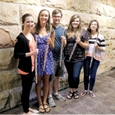Five college and graduate-level flute students were asked to share their experiences to help incoming freshmen and high school students who are preparing for college. They were asked what they wished they had known before they arrived at school as well as about the challenges they faced and conquered.
Sarah Mitchener
Junior, University of North Carolina School of the Arts
Sarah Mitchener is a flute performance major at the University of North Carolina School of the Arts where she studies with Dr. Tadeu Coelho.
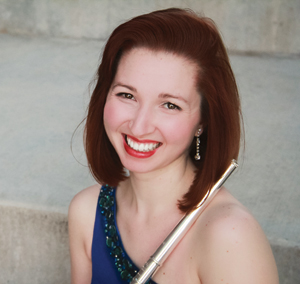 When I left high school, I didn’t necessarily think I had all of the answers, but I certainly believed I knew more than I actually did. Needless to say, freshman year of college was one huge reality check. Through some eye-opening experiences, I gained a decent amount of wisdom and musical understanding that I still carry with me today.
When I left high school, I didn’t necessarily think I had all of the answers, but I certainly believed I knew more than I actually did. Needless to say, freshman year of college was one huge reality check. Through some eye-opening experiences, I gained a decent amount of wisdom and musical understanding that I still carry with me today.
First off, I don’t want to say, “You know nothing,” but really, you know nothing. I wish that I had entered my first year with a more open mind. You certainly have a decent amount of knowledge, but the more receptive and thirsty for knowledge you are upon entering college, the more you will be able to retain lessons, input, and advice. Allow yourself the opportunity to be molded as a flutist and allow yourself to be teachable. That is so important in teacher-to-student relationships.
Speaking of lessons, record them (with your teacher’s permission, of course). Record everything. Start recording yourself from day one, whether it be excerpts, a small passage of a piece, or your warm ups. As a freshman, I did not have a good strategy for recording myself, in terms of how long I spent recording one excerpt or piece before moving on to the next. More often than not, the first take was the best, and each mistake I made from the next take onward caused my attitude towards the process and my playing to snowball downward.
Since I did not record myself often enough (daily), it created pressure and anxiety when I did record my playing. I soon realized that when you record yourself, you receive instant feedback on how you sound. Keep in mind that how you sound to your own ears is not at all how you sound to the rest of the world. Recording yourself allows you the chance to experience what everyone else is hearing. A video recorder will give you a sense of your posture and how that may be affecting the sound. Go over recordings with your teacher or other studio members to receive additional feedback.
One of the greatest lessons I learned that I wish I knew entering my freshman year was in regards to feedback and criticism. I cannot stress the phrase “Take it with a grain of salt,” enough. If you end up performing often, whether it is for the studio, your teacher, or the general public, you are bound to receive verbal feedback on your performances – some good and some bad. Understand that there is something to be learned from everything you hear, whether you agree with it or not. With every piece of criticism, try to find at least one element that you can apply to your playing. If you happen to not agree with a word that was said, try to put yourself in the speaker’s place and figure out what in your playing could have inspired that thought. You will likely take lessons from teachers whose opinions are a stark contrast to your own teacher’s words, but there is something to be learned from everyone. Some of the input you receive will be more difficult to hear than others, but choosing to approach learning with an open heart and mind will be more rewarding in the long run; everything is a lesson.
Finally, the key to growth is fundamentals. It is incredibly easy to get wrapped up in the complexity of the repertoire and etudes you work on, and everything seems to get piled on at once, especially in your freshman year. Do not, however, abandon the fundamentals, including long tones, scales, harmonics, focusing on how your fingers lift and touch the keys, hand position, and embouchure placement. Everything you do builds from here. The harder you are on yourself to polish the foundation of your playing, the greater everything else will begin to sound.
Noah Livingston
Sophomore, St. Olaf College
Noah Livingston attends St. Olaf College, where he studies flute performance with Catherine Ramirez. Past teachers have included Alicia McQuerrey and Carol Gilkey.
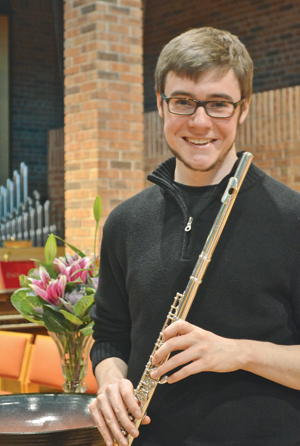 One of the most important things I learned during my first year at St. Olaf is that self-motivation is essential to success. Your professors are there to help you along the way, but ultimately you have to be the driving force behind your development as a musician. This means finding the time to practice and practicing efficiently, so that you can come prepared to each and every lesson and rehearsal.
One of the most important things I learned during my first year at St. Olaf is that self-motivation is essential to success. Your professors are there to help you along the way, but ultimately you have to be the driving force behind your development as a musician. This means finding the time to practice and practicing efficiently, so that you can come prepared to each and every lesson and rehearsal.
You also have to create opportunities for yourself. Ask your teacher about local competitions and masterclasses and apply for them. Research summer festivals and workshops and send in audition tapes. Explore chamber music and other performance opportunities within the music department at the college. Basically, use all the resources at your disposal and always seek out ways to improve your musicianship.
It is also worth mentioning the social dynamics of a college flute studio. At first I was terrified to play in studio and was shaking like a leaf for the whole performance. As I got to know the other flutists, I became increasingly at ease. I realized that my peers wanted me to succeed just as much as I did and that everyone in the studio was there to support and learn from one another. Now some of my closest friends are my studio mates. When it is your turn to play in studio for the first time, remember that studio is a learning experience, not a competition, and that all the other students are on your side. Fellow flutists are frequently friendly.
On a more general note, get lots of sleep. College can be stressful, and you want to be operating at 100%. Prioritize getting eight hours of sleep every night, even if it means skipping a party or saving biology reading for later. You are doing yourself a total disservice by practicing or studying into the wee hours of the morning. Do yourself a favor and let your brain recharge.
Amanda Wilk
Graduate Program, Indiana University
Amanda Wilk graduated from the University of Alabama with a B.M. in Flute Performance and a B.A. in German, and is attending Indiana University Jacobs School of Music to pursue a master’s degree in Flute Performance. As an undergraduate she studied with Diane Boyd-Schultz, and she will be studying with Thomas Robertello at Indiana.
 Before college I really had no notion of performance anxiety. Sure, I got nervous when I had to talk in front of large crowds or when I had a solo in band, but who doesn’t? Being nervous is a natural part of life – it happens to literally everyone. I had no idea how bad performance anxiety could be until my junior year of college when I decided to take the flute seriously.
Before college I really had no notion of performance anxiety. Sure, I got nervous when I had to talk in front of large crowds or when I had a solo in band, but who doesn’t? Being nervous is a natural part of life – it happens to literally everyone. I had no idea how bad performance anxiety could be until my junior year of college when I decided to take the flute seriously.
When I started college, I was a music therapy major. I enjoyed playing flute in high school and thought that I was pretty good but never in a million years did I think I would ever pursue a career in performance. The further I got into college the more I realized I wanted to be a professional musician. I started caring more about my playing and eventually switched to performance. While I felt much happier when I found my calling, performance anxiety really started to kick in. The more I cared, the more I shook when I played an exposed part in a piece. The more I shook, the more I started to freak out and overthink every single detail of my playing. The more I overthought and overanalyzed, the worse I played. Performance anxiety is a perfect example of the snowball effect, and it is not pretty.
Everyone handles performance anxiety differently, and not everything works for everyone. Some of my friends try physical remedies. I know a few who eat bananas an hour before a concert, and one who does jumping jacks to get her blood pumping. Others try a mental approach of imagining the audience in their underwear, while another treats the performance as a rehearsal in fancier clothing. The following mental tips work for me:
1. Perform as much as you can. The more you perform, the more you get used to it.
2. Make sure you are prepared. You may still shake, but you will be less likely to make a mistake if you know what you are doing. (Side note: slow practice is your best friend.)
3. Remember that people come see you perform because they want to hear you be successful. No one goes to a concert hoping for your ultimate demise.
4. Try to clear your mind and only focus on the music. This one is tough to do, but try to make whatever is happening in your personal life not affect your playing.
5. Do not overthink! This is very important. If you mess up, move on. Don’t focus on that one mistake. I have found that if you hang up on even the tiniest of mistakes, it will affect your playing, and you will continue to play mistakes.
6. Remember one performance does not equate to how you are as a musician. We are human. Everyone has bad days, and everyone makes mistakes.
7. On that note, try not to focus on other’s opinions. I have found that the more I worry about what others think, the more nervous I get. Everyone is going to have different thoughts. At the end of the day, only your opinion matters.
8. Finally, remember why you perform: to share your passion and love for music with those who are willing to listen.
Performance anxiety cannot be cured overnight. In fact, you may never completely get over it (which is okay because it is not the end of the world). You can minimize its effects and make sure that it does not dominate your life. Some of these tips may help you and some may not. It is a process of trial and error to find out what works for you. I have found that performance anxiety is more of a mental game for me, but I would also recommend trying out various physical tricks that may help. Performer’s anxiety is frustrating and discouraging, but tenacity can and will lead you to success.
Nicole Jackson
Graduate Program, University of Memphis
Nicole Jackson is a graduate of Henderson State University (BM Music Education) and the University of Memphis (MM Flute Performance).
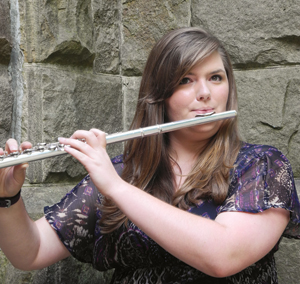 When I began college, I was a quiet freshman who did not venture too far out of my comfort zone. Sometime during the first semester I became friends with a few of the other students in the flute studio. We would often hang out outside of rehearsals, and I began to realize how important it was to have friends who understood all of the challenges that I was facing in my own playing. As my first semester came to a close, the other flute students and I began preparing for ensemble placement auditions for the following semester. It was during this time that I realized how important it is to have positive relationships with the other members of the flute studio.
When I began college, I was a quiet freshman who did not venture too far out of my comfort zone. Sometime during the first semester I became friends with a few of the other students in the flute studio. We would often hang out outside of rehearsals, and I began to realize how important it was to have friends who understood all of the challenges that I was facing in my own playing. As my first semester came to a close, the other flute students and I began preparing for ensemble placement auditions for the following semester. It was during this time that I realized how important it is to have positive relationships with the other members of the flute studio.
Each day they would set aside time from their own practicing to help me prepare for my placement audition. In return, I would often listen to their excerpts and provide any feedback that I could. This practice continued long after we had finished our auditions. We would get together often to listen to each other play before other auditions, studio classes, and recital hearings. The results of this practice began to reach further than just making our individual playing better. Being able to do this as a group taught us all how to listen critically to one another’s playing, how to take criticism in a positive way, and how to diagnose and fix a problem when we heard it. Ultimately, it allowed us to develop an atmosphere of mutual respect where we were able to emphasize our strengths and strengthen our weaknesses. This experience helped me to understand that I was surrounded by some of the most valuable resources for improving my musicianship.
I have found these types of connections to be vital in maturing as a young musician. Competition is a wonderful thing when it is healthy, but there is also something wonderful that can happen when your approach to others in the studio turns from “I want to beat him at the next ensemble audition.” To “Hey, that was cool! Can you teach me how to do that?” I saw a huge change in my musicianship and teaching ability when I shifted from a competition-driven mindset to one that focused on learning from everyone in the studio. These are the people you will continue to play with for the rest of your career and your connections can prove indispensable.
Even if you end up at a school where this is not the immediate atmosphere of the flute studio, do your best to make it a positive experience for all of those you interact with. Make friends and sightread duets. Ask them to help you with a piece you are struggling with, or even build them up when they are really struggling with their own playing. Music can be a difficult career, so why make it harder than it has to be. Learn from and help those around you.
Indigo Fischer
Sophomore, University of Colorado Boulder
Indigo Fischer is a junior at the University of Colorado Boulder, where she is studying flute performance with Christina Jennings.
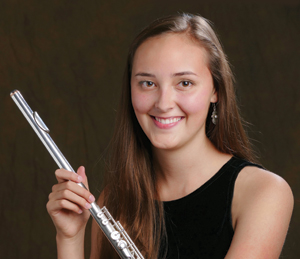 Unlike most people, my first year of college was not my first year of living away from home. I left my little hometown of Eureka Springs, Arkansas before my junior year of high school to attend Interlochen Arts Academy, a fine arts boarding school located in the woods of northern Michigan. This early transition to a conservatory-like high school was very similar to what most people experience going to college. Due to Interlochen’s intensely busy and professional atmosphere, I quickly had to teach myself skills that would keep me afloat and continue to be important in college.
Unlike most people, my first year of college was not my first year of living away from home. I left my little hometown of Eureka Springs, Arkansas before my junior year of high school to attend Interlochen Arts Academy, a fine arts boarding school located in the woods of northern Michigan. This early transition to a conservatory-like high school was very similar to what most people experience going to college. Due to Interlochen’s intensely busy and professional atmosphere, I quickly had to teach myself skills that would keep me afloat and continue to be important in college.
Time management is critical because time in college is sparse, and time as a music major is all but nonexistent. I found out freshman year that planning out daily practice times is extremely beneficial. Routine times of practicing throughout the day became as fixed and non-negotiable in my schedule as going to class. With all of the tasks that have to be done and little time to do them, structuring the day hour-by-hour is the path to success. I kept track of all of the practice sessions, rehearsals, classes, lessons, concerts, and other obligations going on during the school year by using Google Calendar. Its accessibility on both my computer and phone means that I can conveniently add an event to my schedule the instant I learn about it.
I use Google Drive to organize all of my video and audio recordings, photos, essays, and current resume and bio. This way, if I need to search for or share information, I can easily and quickly access everything I need through the app on my phone. Spending a bit of time to organize your professional documents always saves time in the long run. I also have a Google Doc (similar to a Word Document) with my bios in chronological order, so that whenever I need to submit a bio, I copy my latest version, paste it to the top of the document, and update it accordingly. That way, my most current bio is always at the top of the Doc, but I can use older versions below for reference if needed. A word about bios and resumes: no matter how young or lacking in experience you are, start writing a bio and resume. Don’t be intimidated by professionals’ extensive resumes; yours will be like that someday. Start early and refine the document as you gain more experience.
Slow practice is worth its weight in gold. Each time we practice something, we are making that neural pathway stronger (read The Talent Code by Daniel Coyle for more on this topic). So practice slowly and ensure that you are building the correct pathways the first time. Slow practice also gives your physical body time to catch up with your mind. Once slow practice has set a firm foundation on a certain concept, you are ready for more gestural, faster practice. Never skip the step of slow practice and dive directly into hurried practice at the cost of making mistakes.
There is so much to learn, and so many opportunities to do so. Soak up every bit of knowledge like a sponge. Keep a flute notebook and write down information that catches your eye. With all the frustration that comes with being a musician, don’t forget how incredibly fortunate you are to be creating art and doing something that you love.
* * *
Some Things to Avoid: Instrument Disasters
Nicole Jackson
In my first semester of college, I managed to make third chair in the wind ensemble. For our first concert, I was doubling flute and piccolo on one of the pieces. I had been in classes all morning and afternoon on the day of the first rehearsal. I found myself literally running to the rehearsal immediately after another class. I managed to make it with about five minutes to spare, so I got my flute and music out and began to warm up, still a bit frantic from my busy day. Rehearsal started, and everything seemed to be going well until I remembered that the piece we were rehearsing was the one I played piccolo on for the last half. Luckily, it was in my bag right next to me. As soon as we stopped to work on something, I reached down to get the piccolo ready for later in the piece. I was so concerned with getting my piccolo out that I completely forgot about my flute sitting in my lap. When I sat back up to put my piccolo case in my lap, I knocked my flute out of my lap, and it hit the music stand in front of me as it fell to the floor. I was mortified. The director stopped what he was doing to ask what happened and if everything was okay. I sheepishly answered and began to pick up my flute only to realize that one of the keys was bent pretty badly out of shape. Needless to say, as soon as the rehearsal ended, I drove to the closest repair shop to see if they could fix it quickly so that I did not have a broken flute for my first lesson with my new teacher the next day.
Sarah Mitchener
No matter how flustered you get for an audition, lesson, or masterclass, take care of your instrument. Don’t skip steps, don’t overlook caring for it, and whatever you do, don’t force it. I had an audition for a large orchestra piece coming up quickly, and I was auditioning on both flute and piccolo (though I was more hopeful for piccolo). In my frantic scrambling around before leaving home after a break, I forgot to grab my piccolo cleaning flag to put in my bag. I had returned to school before I realized that I had forgotten it. I only had 24 hours before my audition, and clearly needed a cleaning flag, since moisture builds up in a piccolo much more quickly than a flute. I decided to go to the nearest band store near campus to check up on their supply of cleaning utensils. I was gravely disappointed. However, they did have a clarinet cotton brush swab which looked small enough that it could fit into a piccolo, with some trimming up of some of the cotton. I hurried back to school, found some scissors, and set to work. I trimmed it down to what seemed about the size of my piccolo flag and called it a day – and didn’t bother to try it. The day of the audition, I arrived on campus and began to warm up both on flute and piccolo. About 15 minutes before my audition, I decided to swab out the piccolo. I took out my newly-formed piccolo swab and tried to stick it in the piccolo. It went partially in and then came to a screeching halt. In my infinite wisdom, I took it out and tried from the top of the body of the instrument. When it still didn’t fit, I gave it a small push into my piccolo. It gave way, all right, and the next thing I knew a chip of the top of the body fell to the ground. With only a few minutes before my audition, I played a few notes that weren’t extremely clear. I found however that with more air, it would all come out. Although I won the piccolo part, my instrument was not in good working condition. The moral of the story: be kind to your instrument, and it will be kind back to you!
Amanda Wilk
Before getting my current flute, I played on a used flute from 1999. The flute sounded fine but was aesthetically unappealing. Whoever played on it before me had acidic hands, and it was tarnishing to a point where it turned my fingers green. It seemed to break at the most inconvenient moments. When I was a sophomore, I was principal in the University of Alabama Symphonic Band. We were invited to play at the Alabama Music Educators Association convention. The day of the concert my flute broke, and I had to play a fast solo passage. No one had a spare instrument, so I had to play the solo passage with about five different alternate fingerings.
More Things to Avoid:
Bring Your Music & Avoid Injury
Indigo Fischer
In a musical situation that is already highly stressful, you want to minimize the anxiety caused from factors out of your control in order to focus on the music. For example, always check that you have all of your music far in advance. This past fall, on the morning of the Colorado Flute Association Collegiate Competition, I realized that I had left one of the judges’ copies of one of my solo pieces on the copy machine in my college’s music library. Without three copies for the judges, I would be disqualified from the competition. There was no way for me to retrieve the forgotten copy before my bus departed. Thankfully, I was eventually able to print a copy off at a library near the competition venue. I arrived at the venue with just enough time to register, change clothes, and have a five-minute warm-up before it was my turn to go onstage. Somehow, despite all of the trauma of the morning, I won second place!
Noah Livingston
My freshman year was relatively non-catastrophic, but I do wish I could have avoided developing wrist tendinitis. It set in after I went home for Christmas break. I was practicing a lot, and one day I started to feel pain in my right forearm. Despite my best attempts to ignore it, the pain only worsened, sometimes flaring up immediately after I began to practice. As soon as I got back to school in January, I asked my flute professor about the symptoms I was having, and she referred me to a physical therapist on campus. It turns out there is a woman who comes to St. Olaf each Tuesday specifically to help injured musicians. At our first meeting she identified that a combination of over-practicing and an unhealthy hand position were giving me troubles. I carefully followed the regimen of arm stretches she taught me and slightly altered my hand position, and within a couple weeks I was playing completely pain free. If you are ever in a situation where it hurts to play your instrument, don’t be afraid to get help. Playing through the pain will only lead to further injury, and that just is not worth it.
